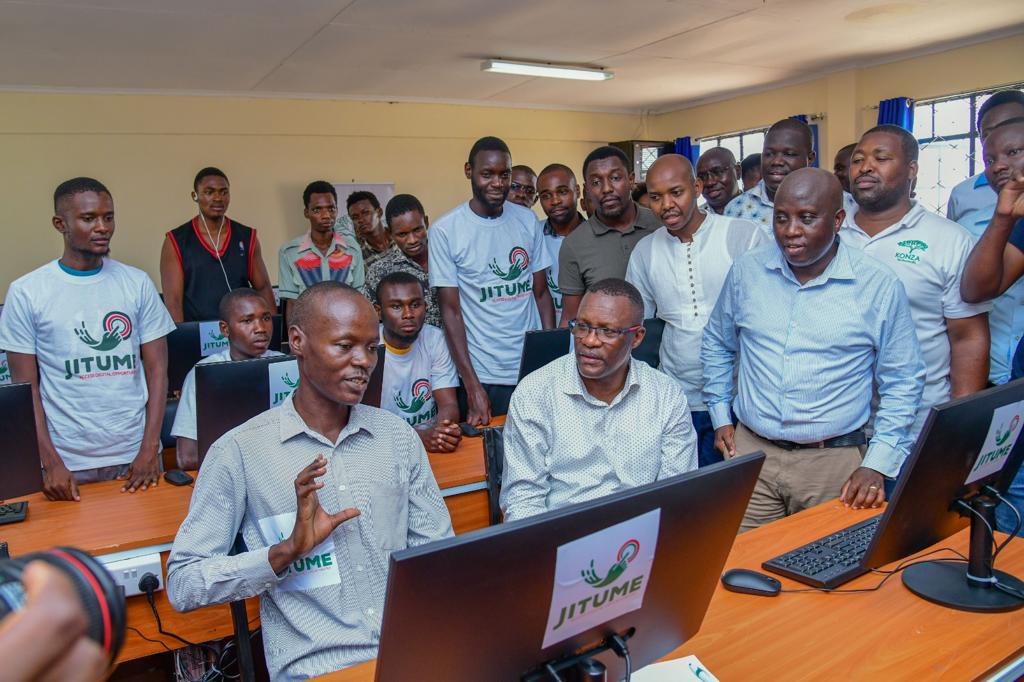 Information, Communication and Digital Economy Cabinet Secretary Eliud Owalo (C) and IC and DE Principal Secretary John Tanui (R) during the launch of the Virtual Desktop Infrastructure Lab at Kinango Vocational and Technical Training College in Kwale County
Information, Communication and Digital Economy Cabinet Secretary Eliud Owalo (C) and IC and DE Principal Secretary John Tanui (R) during the launch of the Virtual Desktop Infrastructure Lab at Kinango Vocational and Technical Training College in Kwale County
NAIROBI, April 11 (NNN-KBC) — The Kenyan government has secured Ksh 50.7 billion ($390M) from the World Bank to increase broadband access to undeserved areas in the country.
The eight year programme which targets to enhace delivery of government services and build skilled manpower for digital economy will be implemented under the Kenya Digital Economy Acceleration Project.
“Broadening access to digital technologies and services is a cross-cutting pathway to accelerate economic growth and job creation, improve service delivery, and build resilience,” said Keith Hansen, World Bank Country Director for Kenya.
The government has already committed to deliver at least 100,000km of fibre optic cable to all wards in the country. To realize this, private sector are expected to take up 48pc of the project with the balance being taken up by the government.
The project will be implemented in two phases with phase one focusing on expanding access to high-speed internet, improving the quality and delivery of education and selected government services, and building skills for the regional digital economy beginning in 2023 to 2028.
Phase two which is expected to kickoff in 2026 through 2030 will involve building a data driven and secure environment for enhanced digital service delivery and innovation for the regional digital economy.
Additionally, the project will also mobilize an estimated Ksh 13 billion ($100M) in private capital by crowding-in the private sector for broadband infrastructure development, the World Bank said.
“The Kenya Digital Economy Acceleration Project aims to help make Kenya’s growth more equitable by shrinking disparities in digital skills and connectivity, and expanding the digital marketplace,” added Hansen.
To enhance delivery of services, the Ministry of Information, Communication and Digital Economy is also in the process of taking 7,500 services online by June this year.
According to the lender, Kenya needs the economies of scale and network effects of a larger and more competitive regional market to achieve its vision to become one of the premier digital investment and innovation hubs on the African continent.
Official data indicates that as at December last year, total broadband subscriptions stood at 47.8 million with the project now expected to enhance last mile broadband access especially in rural areas.
“The initiative will increase last mile connectivity by boosting broadband network coverage for over 70% of Kenya’s population that resides in rural and underserved areas,” said Tim Kelly, Lead Digital Development Specialist at World Bank.
Under the last mile broadband access, 14,000 governmnment and public learning institutions are targeted including provision of 25,000 wi-fi hotshots spread across the country.
The project is also aimed at benefiting the regional digital market with availability of broadband along the country’s borders and boost digital skills to support the uptake of digital services and the development of a competitive labor force for the digital economy, and enhance access to regional and global markets through regulatory and policy harmonization with regional initiatives. — NNN-KBC






